One-Two-Three-Four... 'How the hell I got here was a question I asked myself just about every day.' Marky Ramone Marc Bell grew up in Flatbush, Brooklyn at a time when a drummer strived to be Ringo, when TV shows like 'Man From U.N.C.L.E.' inspired a band name Uncles, Marc's first band. Ditmas Junior High School was no different than any other in America. Garage bands were king. Kids wanted to believe they could be what dreams are made of. '...my parents took me to Milton Afrin's music store on Church Avenue where they bought me a very basic drum set. The deal was they wouldn't get me anything expensive until they were convinced I was going to stick with the drums. The kit consisted of a bass drum with a single tom mounted on it, a hi-hat, and a ride cymbal. Of course I already had a snare. The new kit was a Zim-Gar brand with the logo printed on the bass head. That wasn't going to cut it, because Ringo used Ludwig drums. So I wrote Ludwig and asked them to send me a large sticker. When the Ludwig sticker came in the mail, amazingly, I immediately stuck it over the Zim-Gar logo. Right below it I spelled out The Beatles in black electrical tape.' Marky Ramone
Then there was the look, the image that made a kid fit the part of a musician. Marc understood and embraced the shaggy hair, the Beatle boots gradually morphing to what was most comfortable, leather jackets and jeans. But a star isn't born overnight. First he has to sweat. Later comes Punk Rock Blitzkrieg: My Life As A Ramone written by Marky Ramone with Rich Hershchlag which is a cultural history of punk from the front lines. Before seventies' contemporary rock shifted from innocence to arrogance Marc embraced the drummers of the time.
'In the spring of 1966, the Who released the album My Generation...The chords came on fast, hard, and powerful, and the drummer Keith Moon was doing things I had never heard before. Not even close.' Marky Ramone Another influence on Marc was drummer Hal Blaine from the California 1960s anonymous group of players known as The Wrecking Crew. According to Blaine, the name 'The Wrecking Crew' was derived from the impression that he and younger musicians made on the business's older generation who felt they were going to wreck the music industry. Dick Clark commented that he didn't even know the bands weren't playing their own music until The Monkees came along. Nothing concerning music went unnoticed by the upcoming drummer of The Ramones ranked by Spin Magazine as the #2 'Greatest Bands of All Time', second only to the Beatles. Marc was just happy in the beginning when his family moved into their first-floor three bedroom apartment. 'My new room faced the alleyway on the side of the building where the super kept the garbage cans. It was hard to ignore the smell of tossed-out banana peels and grease wafting through the window, especially during the hot summer months. But it was a small price to pay for having my own room-my own studio. The more I played the drums, the less I noticed the stench.' Marky Ramone
At an early age, Marc understood that it was up to the drummer to keep the song on track and lead rather than follow. As one would expect, he continued the lessons that Mitch Mitchell of Jimi Hendrix Experience, Ginger Baker of Cream, and John Bonham of Led Zeppelin would provide never faltering in his love for the drums. During the changing landscape of the late sixties with Brooklyn's alteration in style from greasers to miniskirts and bell-bottoms, Marc ventured out to Bill Graham's Fillmore East lucky to sneak in and see bands like Iron Butterfly, Buddy Guy, Jethro Tull and on occasion be allowed to step onstage and play on the first band's gear. 'We were loud. Not too loud, because we didn't want to pay for a busted speaker cone or have a seasoned roadie with a Hell's Angels tattoo come after us.' Marky Ramone
Now in a new school with new players, Marc was jamming with Velvet who was supposedly being taught everything he knew about guitar from the master himself, Hendrix.
'One night (we) went to a club called Salvation on Sheridan Square in the West Village...Hendrix had played there as a relative unknown a couple years earlier. Now as a celebrity, he hung out at the club and had invited Velvet to meet him there...Velvet led us over to a round table where three guys were drinking and smoking: Jimi Hendrix, Buddy Miles, and Jim Morrison.
The next day at school, I told my friends where I had been and who I was with. They sort of believed the where. As for the who, they thought I was bullshitting, tripping, or both.' Marky Ramone All of these precious moments were enough to change Marc's life. Then came the phone call, 'It was Kenny Kerner, who explained that Richie Wise felt that Anthony LaTorre's drumming wasn't cutting it. Kenny asked me if I would be interested in coming down to audition, and I said yes...When you heard a band, and the drummer wasn't up to par, even if you didn't know much about music, you would say something was missing...There was no hiding it.' Marky Ramone First he has to sweat.
"Me and Joey did an interview (Joe Franklin Show) Joey confessed I was his favorite drummer." Marky Ramone
With the audition came a new challenge, original songs and the break-out power trio Dust in the spirit of Cream, Grand Funk Railroad, and Blue Cheer. When Marc's grandparents moved to Florida, they let the Bell family move in rather than selling. Dust was newly formed and needed a place to rehearse, the basement. 'We were crammed into a twenty-foot-by-twenty-five foot area, with enough gear to play a small auditorium. By the time we were done rehearsing, my ears were always ringing. One time when we were bringing up Kenny's equipment, we noticed a fine white powder coating the hood of my parents' car parked in the driveway. We realized it came from the stucco from the exterior of the house. We had played so loudly, we brought the house down, literally.' Marky Ramone In the spring of 1970, Kenny decided the band was ready to be shopped to record labels. With the help of a friend lending a mixing board and a reel-to-reel tape recorder, Dust produced and engineered with a single microphone set up in the room a demo that landed in the hands of Neil Bogart at Kama Sutra/Buddah Records known in the sixties for lighter music like The Ohio Express and 1910 Fruitgum Company but also bands like Lovin' Spoonful. Just shy of his eighteenth birthday, Marc and Dust were offered a two record contract. 'Marky and I are from the 70's; as a drummer from the 70's he can show the new boys a beat or two! He's a legend!!!' Peter Criss of Kiss.
'Marky was a good drummer. I used to see him in Dust. He actually tried out for the New York Dolls after Billy Murcia died in 1972.' Sylvain, On The Road With The Ramones, Monte A. Melnick and Frank Meyer.

What Marc drooled over for years now became a reality, a trip to Forth-Eight Street where he could buy a whole new Ludwig kit with an oversized twenty-eight-inch bass drum. Dust got to hire roadies who had once been neighborhood friends pitching in for free. For recording Marc hired drum tech Max Blatt to tune the drums. Dust recorded their first album in September of 1970 in Bell Studios in Manhattan. What Marc learned early on came in handy during the recording. The tendency to speed up during a live performance was acceptable but keeping time was his job. He loved the challenge with songs like 'From a Dry Camel' to 'Love Me Hard'. The other lesson he had learned which would serve him well later in his career was he knew his band members as well as he knew his drums. The proto-heavy metal band Dust was not only trailblazing and ahead of its time but the self-entitled album Dust managed to break the Billboard Top 100 chart. For promotion, the record company landed them a tour opening for Alice Cooper. 'Alice Cooper's tour was mostly midsized arenas: four, five, six thousand. To us, it could have been Woodstock.' Marky Ramone.
Just as times changed in 1963, moving into 1972 began to change music into subgenres. The mythmaking powers of what had started out as an incredible influx of talent began to morph into repeats of the blinding ambition the future music industry held. That left it up to the underground to reset the thermostat, flipping the finger to the smug soon-to-be past of Rock and Roll. It wasn't the end of the century, but it was pretty damn close. As the Dust settled, the New York Dolls peddled trans-gender posturing, were dumped by record companies and transformed the non-existent music scene into an unrepentant saga that would eventually become punk rock. Marc found a place he could get comfortable in his leather jacket and jeans. Max's Kansas City when opened in 1965 became home to the so-called Beat Generation writers and artists like Allen Ginsberg and William S. Burroughs. Later Andy Warhol followed with his Factory crowd and helped change Max's into a rock venue with musicians like The Velvet Underground, Heartbreakers. Iggy Pop, even those like Bruce Springsteen and Bob Marley. Max's went through several incarnations and during the third one, Marc met Wayne County, part of Warhol's crowd and the stage production Pork, later signed with MainMan Artists.
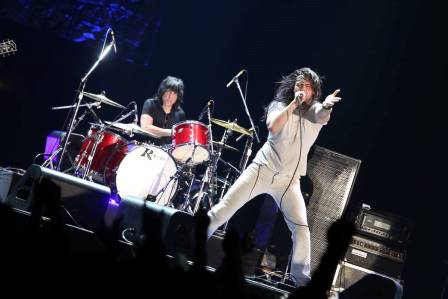
'...And here was Wayne County sitting across from me as I drank a vodka martini and wondered what the occasion was. He was in outrageous attire, but the male sort: denim from head to toe and a big pimp hat with wide brim. He told me he was putting together a band called Wayne County and the Backstreet Boys, and they were looking for a drummer. By the end of my vodka martini, I was a Backstreet Boy.' Marky Ramone The outrageous presence of Wayne County followed the band everywhere even into a mob-run New Jersey bar where manager Peter Crowley received a beating from an old bouncer who didn't realize doo-wop had gone out-of-style. But the story followed Wayne back to New York City and created a buzz. That bought them a recurring gig at 82 Club, but no record deals. 'It was a small world, and the world of rock and roll was even smaller. At the same time, the larger world was beginning to catch on to the punk sounds and sensibilities of New York and London. And I was looking to catch on again somewhere.' Marky Ramone 'Marc Bell was great in Dust, in Wayne County & The Backstreet Boys and in The Voidoids.' Peter Crowley.
'When Roxy introduced me to Richard Hell one night at her apartment during a hell of a party, he was in the process of putting together a new band and looking for a drummer...He wore his hair kind of spiky...his jeans were old and falling apart and held together by a bunch of safety pins. It was either the end of a wardrobe or the beginning of a new look.' Marky Ramone Blank Generation, released in November of 1977, brought The Voidoids to the UK and fame that was confined to London and New York City. America viewed punk rock coming through on the Sex Pistols' coattails but it was bands like the Ramones and Television who had given a jump-start to the dying seventies. 'Marc Bell was great in The Voidoids. They were an important and original seminal band in the NYC punk scene.' Cynthia Ross, Bassist, 'B'Girls, New York Junk Sometimes life just plays itself out, as in the case of Marc's association with The Voidoids.
'I knew as full of himself as he sometimes was, Richard didn't realize the talent he really had or how close we were to going over the top.' Marky Ramone One-Two-Three-Four...
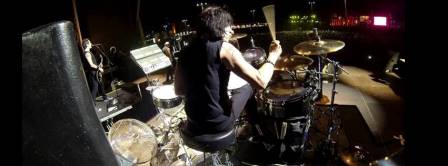
When owner Hilly Krystal built a large stage for CBGB's, he was probably as shocked as everyone else that the once Country, Bluegrass, and Blues dive in the Bowery next to a flop house would be the breeding ground of a music revolution. 'Every time I ran into Dee Dee at CBGB in the winter of '78 he told me I should join the Ramones. As if you could just do that, like joining the Y or the ACLU...But when Johnny Ramone asked to meet with me about joining the band, the whole proposition turned real.' Marky Ramone
Hey Ho, Let's Go...The Audition... 'When I walked into Performance Studios on East Twentieth Street in Manhattan and sat down, Tommy was sitting at a drum set behind the set I would be using. It was an unusual way to run an audition, a show or anything musical unless maybe you were in the Grateful Dead. I asked him what this was all about. 'Don't worry about it,' Tommy said. 'Just in case you need a little help.' 'Thanks,' I said. 'I got it.' I shot Tommy a little smile.' Marky Ramone.
"It was good seeing Marky back in the band a second time. He's a great drummer." Clem Burke, Blondie
Dee Dee counted 'One-two-three-four!' launching them into 'I Don't Care', a pure rock and roll song with a deliberate beat underpinning a progression based on E, F, G, A, a song a novice could learn and summed up in two lines like a punk mantra.
'The song clocked in at a minute forty seconds. We were locked in as a band within the first ten of those seconds. Thirty seconds in, the audition-if there ever was one-was over. We were relaxed and smiling. Rehearsal had begun.' Marky Ramone.
Recording for the new album, Seymour Stein's Sire Records Road To Ruin, was set to begin in less than three weeks. Stein has been credited as saying he had no choice but to sign The Ramones because they played so fast. Fourteen songs would make up the LP. Twenty-four songs would make up the show. 'I understood my role from the get-go. I was not a ringer, mercenary, hired gun, or a session player. I was a member of the band who could nonetheless deliver what a ringer, mercenary, hired gun, or session player could deliver. But I wanted to take it a step further. I wanted to help take the band's sound to the next level.' Marky Ramone And Marky Ramone did just that, taking on the stage surname as a tribute to Paul McCartney's pseudonym, Paul Ramon, back from when the Beatles were the Silver Beatles. Marky's attempt at changing a cheap drum set into Ringo's Ludwig kit with a sticker and black electrical tape reading 'The Beatles' came full circle. He was the Ringo of The Ramones! 'Thankfully, with advice from Tommy, they wound up choosing Marc Bell who I knew from Richard Hell and The Voidoids, also a Sire band. Marc is a drummer supreme, and was a perfect fit in every way...' Seymour Stein, Co-founder Sire Records.
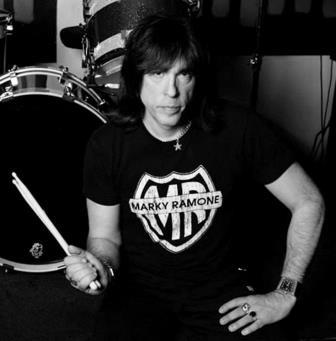
'On June 29, the Ramones' fifteen-passenger Ford Econoline van picked us up around noon in front of (lighting and art director) Arturo Vega's loft on East Second Street in Manhattan...We were headed to Poughkeepsie, New York for my first gig with the band.' Marky Ramone. 'Marky was a great drummer, and when Tommy left, he took The Ramones to a new level.' Monte A. Melnick, Road Manager for 22 years and 2,263 live shows Before the Chance Theater show, Manager Danny Fields came by to take a photo for the back cover of Road To Ruin. 'The four of us sat on the stoop at the rear exit. Dee Dee and Johnny sat on the lower step at opposite ends. Joey and I sat in the middle of the upper step. Joey's long skinny legs reached all the way down to the brick pavement with length to spare.' Marky Ramone. Road manager Monte A. Melnick had said, 'Once we were headliners, everybody opened for us. It was a running joke that if you opened for The Ramones that you'd go on to be huge...' And huge The Ramones would become, nailing themselves to the pages of rock history. 'Like any other great group, this one is always topping itself, 'I Wanted Everything,' 'I'm Against It,' and 'She's the One' are as good as any they've ever done.' Robert Christgau, Rolling Stone.

'I just wanna have some kicks, I just wanna get some chicks, rock, rock, rock, rock, rock 'n roll high school.' Ramones. 1979 with a 200,000 dollar budget Mount Carmel High School became the location set for the filming of Rock 'n' Roll High School. 'Vince Lombardi High School, the story goes, gets a new principal who is hard-line, old-fashioned, eccentric schoolmarm looking to make a name for herself and is ready to steamroll anyone who gets in her way. Riff Randell...number one Ramones fan gets in Principal Togar's way from the beginning. Randell's goal ( with forged absent notes) is to get to Joey at a Ramones concert and give him a song she wrote for the band...Principal Togar smells a rat and declares war. The war concludes with the Ramones and the kids taking over the school and blowing it up. The band always liked happy endings.' Marky Ramone.
Producer Phil Spector was remixing two songs for the movie soundtrack of Rock 'n' Roll High School. The Ramones were getting paid scale for the movie, but there were perks. 'For me, the biggest perk of all was working and hanging out with a legend...We had a sort of Bronx-Brooklyn crosstown mutual respect. We both hated bullshit-giving and receiving. And I loved the girl groups, the Beatle stuff, and just about anything Phil Spector had anything to do with.' Marky Ramone.
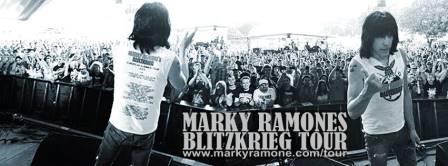
'The Ramones are one of the three or four most influential American rock bands of all time, and their story, as related by surviving member Marky Ramone, is both entertaining and enlightening, So put on your old leather jacket, scream 'Gabba gabba hey' at the top of your lungs and dig in.' Stephen King on Punk Rock Blitzkrieg, My Life As A Ramone The Ramones were racking up the disciples of their own. Rockers like Black Flag, The Germs in L.A. and bands like U2, Green Day, Rancid, Soundgarden, Eddie Vedder, Motorhead's Lemmy, Red Hot Chili Peppers would come to respect and adore the continuing legacy. Even author Stephen King invited the entire band to his house in Bangor, Maine. When he handed Dee Dee Ramone a copy of his book, Pet Sematary, the prolific songwriter/bassist wrote in one hour a song that would hit #4 on the Billboard Modern Rock chart and become part of the soundtrack to Pet Sematary.
Aidios Amigos was an appropriate title for The Ramones final studio album in 1994. 'We still had some gas left in the tank, but the good-bye was well thought out. Our amigos were everywhere, including Iggy Pop, the forerunner of everything punk was about. Our amigos were all over the world and growing in numbers even as we prepared to wrap it up.' Marky Ramone.
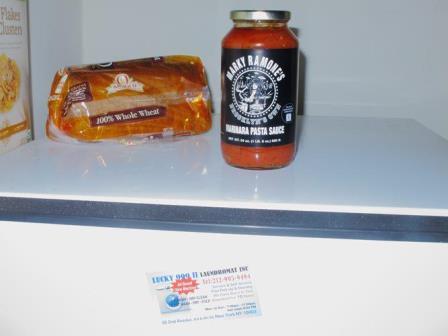
'The first word out of the kids' mouths I teach English to in Brazil is RAMONES!' David Rat, poet, recording artist. 'A lot of being in a band feels like pushing a cart up hill. Record, tour, record, tour-left, right, left, right. There is a fear that if you let go, the cart will start to roll backward and pick up steam. But if you're really lucky, there comes a time when the cart is rolling downhill forward and all you have to do is enjoy the ride.' Marky Ramone Documentaries are the way history is now chronicled. 'Raw' 2004 was released as a compilation of home videos filmed predominately by Marky and entered the Billboard video chart at number 5. It has since been certified gold in three countries and currently the best-selling Ramones DVD release to date. It has aired on VH1 Classic. 'When I appeared on Sirius Satellite Radio's The Wiseguy Show one day in late 2004, it seemed a natural thing to do. Hosted by Vincent Pastore, who played Salvatore 'Big Pussy' Bonpensiero on the HBO hit series The Sopranos, the show was ideal for a Brooklyn guy with something to promote...It was a new kind of a fraternity. I felt strangely at home there, as I did with the wiseguys...It was about to become even more of a home. A few days later, I got a call...' Marky Ramone.
Today, Marky is on his 10th year as a DJ for SiriusXM Satellite Radio, hosting 'Marky Ramone's Punk Rock Blitzkrieg.' He has appeared on numerous TV shows, and with no signs of slowing down, continues to tour with his band, Marky Ramone's Blitzkrieg featuring various lead vocalists-including Andrew W.K. U2's Bono presented The Ramones with their MTV Lifetime Achievement Award in 2001, and then in 2002 they were inducted into the Rock and Roll Hall of Fame. The Ramones received a Grammy Lifetime Achievement Award in 2011. It was the first Grammy for the punk rock pioneers.
As one would expect, Punk Rock Blitzkrieg: My Life As A Ramone is the final word on the genius and mischief of the Ramones, told by the man who kept the beat and lived to tell about it. Marky feels blessed to have known all of them, Johnny, Dee Dee, and Joey and to have lived long enough to realize something very important. The time they were looking forward to is now.
'Wayne County was the first person to ever play me the Ramones' first album. I was upstairs at Max's, where he was moonlighting as a DJ...I'd seen them live, but wasn't a fan yet. But when I heard the album, I thought, 'What the fuck?'' Marky Ramone, excerpt from On The Road With The Ramones. 'How the hell I got here was a question I asked myself every day.' Marky Ramone, drummer, author, DJ now knows. So like Stephen King, put on your old leather jacket, grab a copy of Marky's book and at the top of your lungs, scream 'Gabba gabba hey' to the beat of one of the best drummers to come from the punk rock scene!
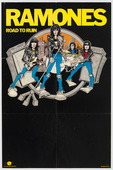
https://www.facebook.com/OfficialMarkyRamone?fref=ts
https://www.facebook.com/pages/Marky-Ramones-Blitzkrieg/268695706480258?fref=ts
https://youtu.be/ZLlLtSG7xe4
https://youtu.be/J4P4ln781D0
https://youtu.be/I_LWHTF3lhU


